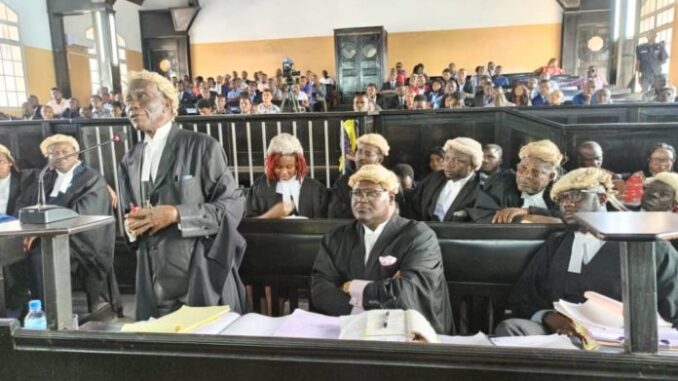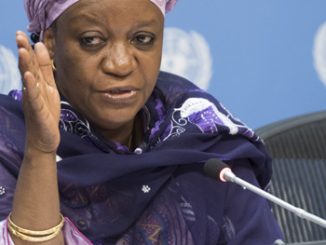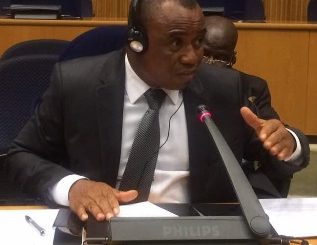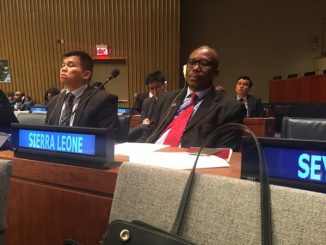
PR system under the 1991 Constitution is not an alternative system of public voting -Dr Abdulia O Conteh
By Ibrahim Kabba Turay
Dr. Abdulia O. Conteh has told the panel of Judges at the Supreme Court of Sierra Leone presided over by Chief Justice Babatunda Edwards, Justice Brown Mark JSC, Justice Deen Tawarlly JSC, Justice Alusine Sesay JSC, and Justice Ivan Sesay JA that, the PR system is not an alternative under the 1991 Constitution system of public voting.
Dr.Abdulai O.Conteh is the lead counsel for the plaintiffs, the main opposition All People’s Congress (APC), Hon.Abdul Kargbo and Councilor Akiratu Maxwell Coker, who challenged the pronouncement of the Chairperson of the Electoral Commission of Sierra Leone that, the 2023 elections will be conducted using the Proportional Representation system.
He made that submission during the public hearing on Monday, 9th January, 2023 at the Supreme Court of Sierra Leone that, the court should grant the relief prayed for against the first defendant, the Minister of Justice and the second defendant the Chairman of Electoral Commission Sierra Leone ECSL.
Conteh cited Section 38 (A) of the Constitutional Amendment Act, 2001, which states that, the controlling provision stipulated in Subsection (1) of the 1991 Constitution further clarifies that, constituencies that have not been established are condition precedent to warrant or justify block system.
He submitted that the declaration of the directive by the president to the Electoral Commission of Sierra Leone ECSL, to hold any public election for ordinary members of parliament by the proportional representation system, where there are extant and subsisting constituencies, is ultra vires the 1991 constitution as amended.
He submitted that the current parliament was itself elected on a constituency basis as provided for in section 38 1,2,and 3 and that those constituencies are still extant and subsisting.
Dr.Conteh submits that revision of constituencies as provided for in sub-section 4 of section 38 does not necessarily result in the establishment of constituencies stipulated in section 38 (1) (2) & (3), but rather the section provides for the period when existing constituencies should be reviewed, which revision may or may not necessarily result in a delimitation of the respective boundaries of existing constituencies.
He submitted that for the second defendant to rely on Section 38A of the 2001 Act, as stated in it press statement, would preclude independent candidates from contesting for parliament as contemplated in section 77 (m) of the 1991 Constitution.
He submits that the entirety of Section 38A of the 1991 Constitutional Amendment of 2001 does not provide nor contemplate proportional representation and that, local authorities were last elected which is the subsisting and lawful basics upon which every public election involving local authorities can be held and not by the proportional representation system
“Section (2) of the Statutory Instrument No. 83 dated 16th November, 2022 making provision for both proportional Representation for Members of Parliament and Local Council election is ultra vires to section 33 and 38 of the 1991 Constitution of Sierra Leone,” he submitted
In response, Solicitor General, Robert Kowa, representing the Attorney General and Minister of Justice, said as at the time of filing the motion in November 2022 by counsels for the plaintiffs, the purported Constitutional Instrument was yet to be law and therefore referred to the submission of Dr. Abdulai Conteh and team as a pre-emptive strike.
He submitted that as per constitutional provisions the census had altered the population density which required a review of constituency boundaries, and further submitted that the president acted within his powers and constitution.
R.B Kowa submitted that Supreme Court cannot inquire into parliamentary proceedings of Section 94 (2) of the constitution and that in that application no certificate of maturity was filed.
In the submission of Lawyer Osman Ibrahim Kanu, he said the court lacks the powers to hear the relief sought by the plaintiffs that, the President acted beyond his constitutional powers to have given such directives for a public election to be held using a PR system instead of constituency basis for an ordinary member of parliament.
Dr. Emmanuel Saffa Abdulai, Counsel for ECSL said everything that has to do with public elections concerns the second respondent and therefore it was in the exclusive position backed by law with special reference to Section 38 subsection 7 of the Constitution, to determine what to do based on the available circumstances.
Dr. Saffa Abdulia said the ECSL acted reasonably and followed due process of the law that, it was practically impossible to conduct the elections based on available population figures and the timeline.
He recalls there’s been a systematic pattern of elections after census and boundaries delimitation after the president had declared an election date.
He said it would be undemocratic to use old census result to do fresh boundaries when there has been a recent population growth of about 57,000.
The Chief Justice who is the presiding judge have inform the counsel representing the plaintiff and the respondent that they will sent notices to both the counsel for the judgment.




